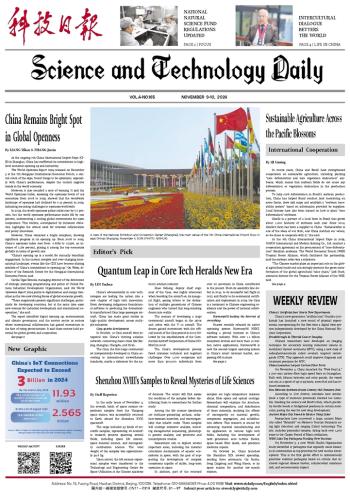
 Intercultural Dialogue Betters the World
Intercultural Dialogue Betters the World National Natural Science Fund Regulations Updated
National Natural Science Fund Regulations Updated China Remains Bright Spot in Global Openness
China Remains Bright Spot in Global Openness Sustainable Agriculture Across the Pacific Blossoms
Sustainable Agriculture Across the Pacific Blossoms Quantum Leap in Core Tech Heralds New Era
Quantum Leap in Core Tech Heralds New Era WEEKLY REVIEW
WEEKLY REVIEW New Graphic
New Graphic Shenzhou XVIII's Samples to Reveal Mysteries of Life Sciences
Shenzhou XVIII's Samples to Reveal Mysteries of Life Sciences PHOTO NEWS
PHOTO NEWS
In the early hours of November 4, the seventh batch of space science experiment samples from the Tiangong space station was successfully returned to Earth aboard the Shenzhou XVIII spacecraft.
The cargo included 55 kinds of scientific samples, representing 28 scientific research projects spanning several fields, including space life science, space material science, and microgravity combustion science. The total weight of the samples was approximately 34.6 kg.
Upon arrival, the life science experiment samples were transferred to the Technology and Engineering Center for Space Utilization at the Chinese Academy of Sciences. The center will first assess the condition of the samples before distributing them to researchers for further study.
Among the life science specimens are methane-generating archaea, radiation-resistant microbes, and microorganisms that inhabit rocks. These samples will undergo extensive analysis, including metagenomic sequencing, phenotypic genetic analysis, and proteome and transcriptome studies.
Researchers aim to explore several important areas, including the material circulation mechanisms of aquatic ecosystems in space, with the goal of supporting the development of complex ecosystems capable of stable, long-term operation in space.
In addition, part of the returned samples are high-temperature resistant alloys, fiber optics and optical coatings. Researchers will examine the structure, chemical composition, and distribution of these materials, studying the effects of microgravity on material growth, component segregation, and solidification defects. This research is crucial for advancing material manufacturing and its application in various high-tech fields, including the development of next-generation aero-turbine blades, space-based fiber lasers, and precision medicine repairs.
On October 30, China launched the Shenzhou XIX crewed spaceship, sending three astronauts, Cai Xuzhe, Song Lingdong and Wang Haoze, to its space station for another six-month mission.

 Next
Next



